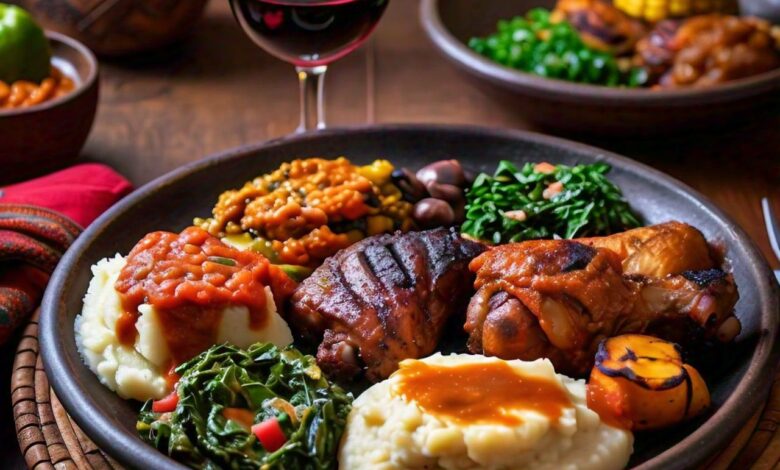Zimbabwe’s Food and Wine Tourism: A Culinary Journey

Zimbabwe’s food and wine tourism is gaining prominence as a unique culinary destination, drawing food enthusiasts and wine lovers alike. This vibrant industry reflects the country’s rich agricultural heritage, diverse cultures, and burgeoning wine scene. As tourists seek authentic experiences, Zimbabwe’s culinary offerings present an opportunity to explore both traditional and contemporary flavors.
A Rich Culinary Heritage
Zimbabwe’s food and wine tourism is deeply rooted in its diverse cultures and traditions. The nation is home to various ethnic groups, each contributing unique ingredients and cooking techniques. Staple foods such as sadza (a cornmeal dish), braai (barbecue), and a variety of vegetables showcase the country’s agricultural richness. Local markets, such as the Mbare Musika Market in Harare, buzz with activity and offer a glimpse into Zimbabwean culinary life. Here, visitors can sample fresh produce and traditional snacks, immersing themselves in the local culture.
Local Ingredients and Traditional Dishes
The emphasis on fresh, locally sourced ingredients is a hallmark of Zimbabwe’s food and wine tourism. Many chefs are committed to using indigenous ingredients, such as wild mushrooms, game meats, and traditional grains. Restaurants like The Boma – Place of Eating in Victoria Falls specialise in traditional Zimbabwean dishes, allowing tourists to savour local flavours.
Moreover, the growing interest in farm-to-table dining experiences enhances Zimbabwe’s culinary landscape. Many establishments now partner with local farmers to create seasonal menus that reflect the country’s agricultural bounty. This approach not only supports local economies but also highlights the freshness and quality of Zimbabwean produce.
The Emerging Wine Scene
In addition to its culinary delights, Zimbabwe’s food and wine tourism features a burgeoning wine industry. The country’s major source of wine is its neighbour, South Africa. Also, wine imports play a major role in the nation’s food and wine tourism. Zimbabwean South African based wine sommelier, Tinashe Nyamudoka has wines in a number of restaurants and liquor stores. The vineyards and wineries industry in Zimbabwe is an area that needs investment.
Unique Wine Varieties
Zimbabwe’s food and wine tourism is distinguished by its unique wine varieties. While the industry is still developing, local winemakers like African Distillers, are producing exceptional wines, including varieties such as Chenin Blanc, Cabernet Sauvignon and Pinotage. The wines produced here are often characterised by their bold flavours and distinctive terroir. For instance, the unique climate and soil conditions in regions like Nyanga contribute to the distinct profiles of the wines. Some of their wines include Green Valley, which is found in many retail outlets.
Moreover, wine festivals such as the Harare Wine and Food Festival celebrate local producers and provide a platform for visitors to sample the best of Zimbabwe’s wine offerings. These events foster a sense of community and showcase the country’s commitment to elevating its wine industry.
Culinary Experiences and Tours
As Zimbabwe’s food and wine tourism evolves, culinary tours are becoming increasingly popular. Tour operators are crafting unique itineraries that combine local cuisine with wine tastings and cultural experiences. Tourists can explore various regions, visiting vineyards, artisanal food producers, and local markets.
Cooking Classes and Workshops
Additionally, cooking classes and workshops offer an immersive way to experience Zimbabwean cuisine. Local chefs teach visitors how to prepare traditional dishes using authentic techniques and ingredients. This hands-on approach not only enriches the travel experience but also allows participants to bring a taste of Zimbabwe back home.
Furthermore, food safaris are gaining traction, blending wildlife experiences with culinary adventures. Tourists can enjoy gourmet meals in stunning natural settings, enhancing their appreciation for Zimbabwe’s diverse landscapes.
Sustainable Practices in Food and Wine Tourism
Sustainability is a crucial aspect of Zimbabwe’s food and wine tourism. Many establishments prioritize eco-friendly practices, such as organic farming and responsible sourcing. This commitment to sustainability resonates with conscious travelers who seek to support environmentally friendly initiatives.
Community Engagement
Additionally, community engagement plays a significant role in the growth of this sector. Many culinary initiatives focus on empowering local communities through training programs and support for small-scale farmers. By fostering these connections, Zimbabwe’s food and wine tourism not only enhances the visitor experience but also contributes to local development.
Conclusion: A Bright Future Ahead
In conclusion, Zimbabwe’s food and wine tourism is poised for growth, offering a rich tapestry of flavors and experiences. From traditional dishes to innovative culinary ventures, the country’s gastronomic landscape reflects its cultural diversity and agricultural potential. As more tourists discover the delights of Zimbabwe’s cuisine and wine, the industry stands to benefit economically and socially.
Ultimately, Zimbabwe’s food and wine tourism promises a unique culinary journey that invites exploration and appreciation. Also, as travellers seek authentic experiences, Zimbabwe emerges as a vibrant destination that celebrates its rich heritage and contemporary innovations in food and wine.




